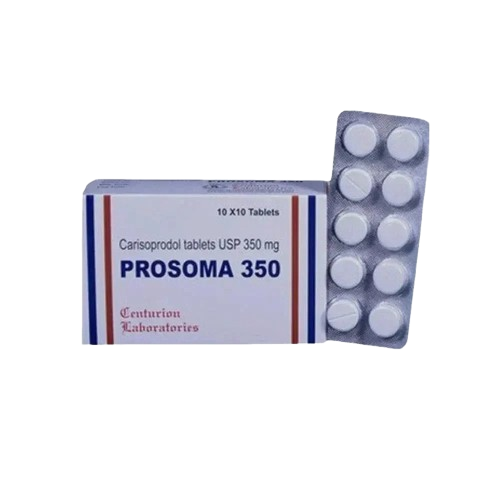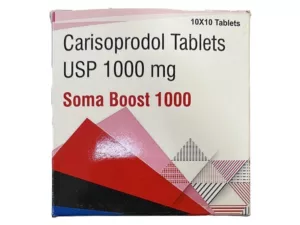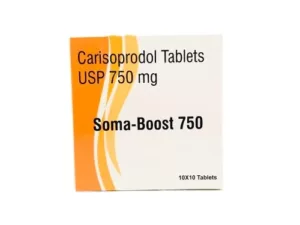“Prosoma 350 mg Tablet (Carisoprodol): Complete Guide to Uses, Dosage & Side Effects”
🔬 What is Prosoma 350 mg?
Prosoma 350 mg is a centrally acting muscle relaxant containing Carisoprodol, used to relieve muscle pain and discomfort caused by strains, sprains, or other musculoskeletal conditions. It works by blocking pain sensations between the nerves and the brain.
It is typically prescribed for short-term use (2-3 weeks) alongside rest, physical therapy, and other treatments.
⚙️ Mechanism of Action
Carisoprodol acts in the central nervous system (CNS) to block interneuronal activity in the descending reticular formation and spinal cord, leading to muscle relaxation. Its exact mechanism is not fully understood but may involve GABAergic effects.
💊 Indications (Uses)
Prosoma 350 mg is indicated for:
- Acute musculoskeletal pain
- Muscle spasms caused by injury or tension
- Adjunct to physical therapy and rest
- Occasionally used (off-label or misuse) for anxiolytic or sedative effects (not recommended)
📏 Dosage and Administration
✅ Typical Adult Dosage:
- 350 mg tablet, taken 3 to 4 times daily
- Maximum duration: Use for up to 2–3 weeks
- Administer with or without food, preferably at the same times daily
⚠️ Long-term use is not advised due to the risk of dependence, tolerance, and withdrawal.
⚠️Contraindications
- Hypersensitivity to Carisoprodol or meprobamate (its active metabolite)
- Acute intermittent porphyria
- History of drug or alcohol abuse
- Severe hepatic or renal impairment
⚠️Warnings and Precautions
- May cause sedation, drowsiness, or dizziness
- CNS depression: Avoid alcohol and other sedative drugs
- Risk of abuse, addiction, and withdrawal symptoms with prolonged use
- Use caution in elderly patients or those with compromised liver/kidney function
- Not recommended in pediatric patients under 16 years
🧪 Drug Interactions
- Alcohol: Increases risk of CNS depression
- CNS depressants (benzodiazepines, opioids, antihistamines): Additive sedative effects
- Enzyme inducers (e.g., rifampin, carbamazepine): May reduce efficacy
- Avoid combining with meprobamate-containing medications
🚨 Adverse Effects
Common:
- Drowsiness
- Dizziness
- Headache
- Nausea
- Irritability
Serious:
- Seizures (rare)
- Anaphylaxis or hypersensitivity reactions
- Drug dependence or withdrawal
- Liver or kidney dysfunction (rare, with prolonged use)
🔄 Withdrawal Symptoms (If Discontinued Abruptly After Prolonged Use)
- Insomnia
- Vomiting
- Tremors
- Anxiety
- Hallucinations (rare)
Always taper the dose gradually if used for more than a few weeks.
🤰 Use in Pregnancy & Lactation
- Pregnancy: Category C – Use only if benefits outweigh risks
- Lactation: Carisoprodol may be excreted in breast milk; not recommended
📦 Storage
- Store at 20–25°C (68–77°F)
- Keep away from moisture and direct light
- Keep out of reach of children
- Store securely due to abuse potential
❗ Abuse & Dependence Warning
Carisoprodol is habit-forming and may lead to physical and psychological dependence, especially with prolonged use or in individuals with a history of substance abuse.
In some countries, including the United States, it is classified as a Schedule IV controlled substance.





Reviews
There are no reviews yet.